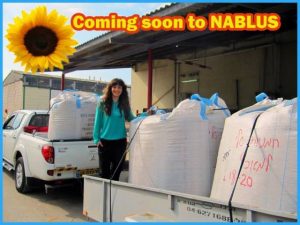Breastfeeding a baby is not only good for the baby, but can go a long way to “greening” Islam.
If you are breastfeeding a baby, some Muslim American bloggers recommend buying a special coverup. Here in the Middle East, modesty among religious Christians, Moslems, and Jews is often associated with inhibitions about nursing in public. But that isn’t necessarily true.
In my years counseling nursing mothers, I’ve found that modest dress and nursing in public are separate issues. Women covered from head to toe can be seen nursing their babies on a park bench, while some mothers in halter tops wouldn’t dream of nursing in public. In countries like the US, where babies are primarily bottle-fed, breastfeeding mothers are frequently asked to leave public places or cover up while billboards with exposed breasts are everywhere.
Breastfeeding is an important part of greening the planet. Manufacture, transport and disposal of formula, containers, and bottles create pollution and use extra water resources. Breastfeeding, and supporting breastfeeding mothers, is one of the greenest things you can do. But in many parts of the world, discomfort about public breastfeeding remains a significant barrier to higher breastfeeding rates.
If a mother needs to find a private place to feed her baby every time she goes out of the house, she’s likely to wean early. One mom told me that when her oldest nursed every three hours, she was able to do errands in between feedings. Her second child nursed more often, so she weaned him to formula to avoid nursing in public.
There is a wide range of attitudes about public breastfeeding in Middle Eastern countries. In traditional societies, breastfeeding is generally the norm. Islamic law requires feeding until age two, and some interpret Jewish law to require it as well. In Jordan, women stay inside with their babies for close to a year.
There may be other reasons that public breastfeeding is rarely seen. In many traditional cultures, women are segregated to begin with so the issue of public breastfeeding does’t come up. In some cultures it’s acceptable to nurse in front of male relatives but not strangers. In stricter Islamic regimes, like Iran and Saudi Arabia, women are never seen breastfeeding in public, whereas in Jordan it is fairly common.
There are many products designed to help a mother nurse discreetly including aprons, cover-ups, and clothing with special openings. But if the mother wears a loose shirt that can be pulled up, or a sleeveless t-shirt under a button-down shirt or jacket, the baby will cover any exposed parts of the mother’s breast and torso.
Not all babies like to nurse with something over their head. Of course mothers can nurse privately if they choose, but they shouldn’t be required to. Offended bystanders are free to move or look away, instead of disturbing the mother and baby. Since a mother’s first priority is to protect her child, she is not in a position to defend herself if attacked or criticized while feeding.
More on breastfeeding:
Guide to breastfeeding in Islam
Ten Tips for Breastfeeding in Public in the Middle East
Keeping Baby Hydrated and Safe in Hot Weather
Why Baby’s First Gift Shouldn’t Be Formula from the Hospital
Save Water and Energy in Your Washing Machine with Top Tips





I’m from Iran… I’ve seen breastfeeding in public. Searched to make sure others have had the same experience, and asked a few other Iranians… breastfeeding in public is very common practice. Look it up.
I’m Muslim but living in New Zealand and here they are very breastfeeding friendly! We have a parents room in most public places that has private areas for women to sit on couches and breastfeed. They play relaxing music and have a kids area so that mom can breastfeed while her other children are close by and both are safe. They have nappy changing stations and toilets. This is always an option for other countries to follow.
Thanks very much for your comment, SHA!
Hello,
I would like to comment on breastfeeding in public in Saudi Arabia. Saudi Arabia has clearly defined laws about exposure, however, when it comes to breastfeeding – they are quite tolerant. Women can breastfeed anywhere, and they are so good at being discrete you would never know. And because most public places have segregated family and women’s areas, a women can be found breastfeeding anywhere. Thanks for the information though!! good post.
thanks for the link, hannah. i hadn’t heard of the book; i’ll add it to my wishlist now.
anon,
Thanks for sharing your experience. Have you read Modja Batterjee’s book on breastfeeding in the Middle East? http://www.greenprophet.com/2010/09/breastfeeding-a-fading-art/
hi, i think you are equating public breastfeeding with showing skin. i was a bit confused at first because hijab is already a nursing cover. i wear a large voluminous one that goes down to my knees so i never had a problem popping a baby underneath to nurse.
i lived in jordan for 7 years and had 3 babies there. i moved to saudi arabia when my youngest was 3 months. my experience was very different from what you’ve written. i’ve never heard of a new mother staying in for a year (!) i couldn’t even make it a week before i was out. friends from turkish and pakistani cultures suggested that i stay in for 40 days. but 1 year? (also, islamic law does not require breastfeeding for 2 years. some schools of law allow it for up to 2 years, others for longer, but i don’t think it’s required at all.)
in saudi arabia i’ve pushed a grocery cart through the store while nursing my baby underneath my hijab, nursed at parks and the beach. but it’s generally more comfortable in saudi arabia because there are female masalas (prayer areas) in many places. usually lushly carpeted and very comfortable, they are places not only for prayer but also relaxation. women sit down and eat ice cream (which is a bit difficult while wearing niqab), nurse their babies, even lay down to take a nap. so it’s easier and more comfortable in saudi where private areas are provided. probably why it’s not seen outside as much.
encouraging breastfeeding is great. but breastfeeding does not have to be immodest and just because you don’t see it doesn’t mean it’s not happening.